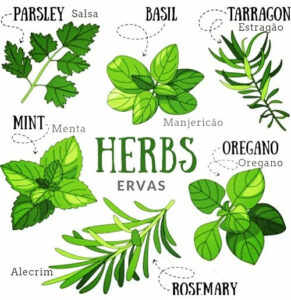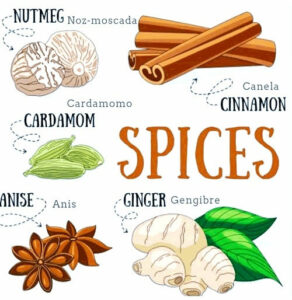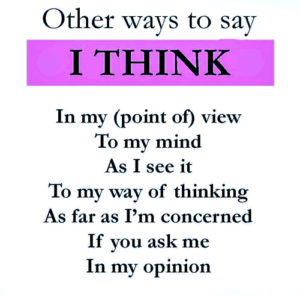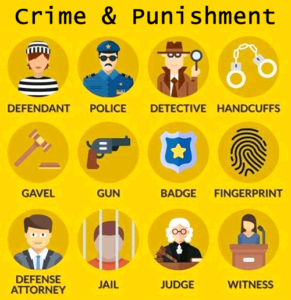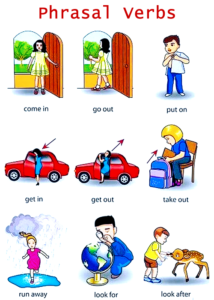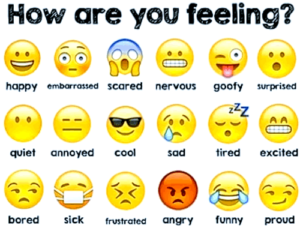Herbs are also products used to flavor foods, but come from the leafy green part of a plant. Here is a complete list of herbs with explanations: Basil – There are more than 50 species of basil, but almost all basil used in the United States is one species that comes from either California, Egypt or France. …
Category: VOCABULARY
Permanent link to this article: https://englishyourway.com.br/vocabulary-herbs/
Feb 16
VOCABULARY – Spices
Spices refer to products used to flavor foods that come from the root, stem, seed, fruit or flower of a plant. Here is a complete list of spices with explanations: Ajwain – Typically ground, these seeds have a strong fragrance with thyme and cumin undertones. They are used in Asian, Ethiopian, North Indian, Iranian, North Indian and …
Permanent link to this article: https://englishyourway.com.br/vocabulary-spices-2/
Feb 12
OTHER WAYS TO SAY … I Think
Can you think of any more? If you have any questions or doubts, please ask in the comments or send me a private message. Follow me on Instagram: @englishyourwaybr or look for the hashtag #LearnEnglishWithCarlo
Permanent link to this article: https://englishyourway.com.br/other-ways-to-say-i-think/
Feb 12
OTHER WAYS TO SAY … Bad
Permanent link to this article: https://englishyourway.com.br/other-ways-to-say-bad/
Feb 12
VOCABULARY – Crime & Punishment
The criminal justice system keep us safe from criminals. When a person arrested by a policeman with a badge and is accused of a crime that person becomes a defendant. Police usually carry guns. A detective usually investigates the crime. Police and detectives usually put handcuffs on the defentant to make sure he cant escape. Later …
Permanent link to this article: https://englishyourway.com.br/vocabulary-crime-punishment/
Feb 12
PHRASAL VERBS – mixed
A phrasal verb is a combination of a verb and an adverb or preposition, for example ‘look up’ or ‘look after’, which together have a particular meaning which is different from the verb alone. The following phrasal verbs are featured in this slide. come in go out put on get in get out take out run away look for …
Permanent link to this article: https://englishyourway.com.br/phrasal-verbs-mixed/
Feb 12
VOCABULARY – Emojis
If you use social media at all, you should be very familiar with emojis – those cute little digital images or icons used to express an idea, emotion, etc. Here are a few of the emotions that they represent: happy embarrassed scared nervous goofy surpised quiet annoyed cool sad tired excited bored sick frustrated angry funny …
Permanent link to this article: https://englishyourway.com.br/vocabulary-emojis/
Feb 12
VOCABULARY – Instead of VERY (7)
The word VERY is an adverb and an intensifier – it comes before an adverb or adjective to make it more intense (to a higher degree). Say frail instead of very weak. Say keen instead of very eager. Say meticulous instead of very detailed. Say perplexed instead of very confused. Say bustling instead of very crowded. Say basic instead of very …
Permanent link to this article: https://englishyourway.com.br/vocabulary-instead-of-very-7/
Feb 12
VOCABULARY – Instead of VERY (6)
The word VERY is an adverb and an intensifier – it comes before an adverb or adjective to make it more intense (to a higher degree). Say sage instead of very wise. Say pouring instead of very rainy. Say cutthroat instead of very competetive. Say stingy instead of very cheap. Say perplexed instead of very confused. Say exhiliarating instead of very …
Permanent link to this article: https://englishyourway.com.br/vocabulary-instead-of-very-6/
Feb 12
VOCABULARY – Instead of VERY (5)
The word VERY is an adverb and an intensifier – it comes before an adverb or adjective to make it more intense (to a higher degree). Say immaculate instead of very neat. Say perilous instead of very risky. Say fearful instead of very afraid. Say innovative instead of very creative. Say wicked instead of very evil. Say excellent instead of …
Permanent link to this article: https://englishyourway.com.br/vocabulary-instead-of-very-5/

